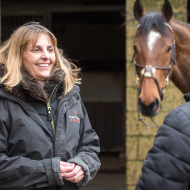Elizabeth Juckes led the study as part of a postgraduate dissertation towards a masters degree in Equine Science.
Lack of training and increased hours cited as key issues
An in-depth study carried out by Hartpury University, in collaboration with the British Racing School, has revealed multiple problem areas in the UK horse racing industry which have contributed to the current staffing crisis.
The study asked 30 participants – made up of junior and senior racing staff and racehorse trainers – to provide their views and opinions on why the industry is having problems. The aim of the study was to investigate these issues, and form strategies to address them.
Major concerns included a lack of management training for senior staff, difficulties in maintaining a work-life balance and the departure of employees aged 25 and over.
An increase in race fixtures, low wages, lack of career progression and perceived generational differences in work ethic were also cited highlighted as having an impact on employee retention.
“The British Horse racing Industry has been experiencing a labour shortage since the 1970s,” said Elizabeth Juckes, who led the study as part of a postgraduate dissertation towards a masters degree in Equine Science.
“Despite recent improvement reported in staff retainment, there is still significantly high reported staff turnover compared to other sectors, and trainers experience challenges with recruiting qualified and experienced staff.”
The study suggested that by implementing improved management training schemes and reducing race-day fixtures, senior staff members would be better supported in their roles, day-to-day pressure would be reduced and job satisfaction could be improved for all staff.
Ms Juckes continued: “Whilst retention will remain an issue for the racing industry in the short term, an opportunity exists for the racing industry to consult with all stakeholders to formulate and implement a strategic plan to address the underpinning themes identified by the study to improve the long-term perspective and safeguard the future of racing and the staff who work within it.”
Image (c) Hartpury University.







 The latest
The latest 
